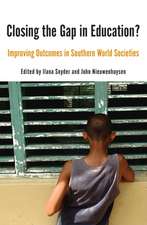Authority and the Teacher
Autor William H. Kitchenen Limba Engleză Paperback – 24 sep 2014
| Toate formatele și edițiile | Preț | Express |
|---|---|---|
| Paperback (1) | 292.53 lei 6-8 săpt. | |
| Bloomsbury Publishing – 24 sep 2014 | 292.53 lei 6-8 săpt. | |
| Hardback (1) | 567.58 lei 6-8 săpt. | |
| Bloomsbury Publishing – 24 sep 2014 | 567.58 lei 6-8 săpt. |
Preț: 292.53 lei
Nou
Puncte Express: 439
Preț estimativ în valută:
55.99€ • 58.22$ • 46.85£
55.99€ • 58.22$ • 46.85£
Carte tipărită la comandă
Livrare economică 15-29 martie
Preluare comenzi: 021 569.72.76
Specificații
ISBN-13: 9781472524287
ISBN-10: 1472524284
Pagini: 224
Dimensiuni: 138 x 216 x 15 mm
Greutate: 0.3 kg
Editura: Bloomsbury Publishing
Colecția Bloomsbury Academic
Locul publicării:London, United Kingdom
ISBN-10: 1472524284
Pagini: 224
Dimensiuni: 138 x 216 x 15 mm
Greutate: 0.3 kg
Editura: Bloomsbury Publishing
Colecția Bloomsbury Academic
Locul publicării:London, United Kingdom
Caracteristici
Challenging and provocative, yet based on sound underpinnings, drawing on work of three major philosophers
Notă biografică
William H. Kitchen is a freelance educational researcher. He currently teaches mathematics at post-primary level in Northern Ireland, and has previously authored Authority and the Teacher with Bloomsbury.
Cuprins
Foreword Chris WoodheadAcknowledgementsPrefaceIntroduction: An Education to be Fearful forPart I: The Background1. Sociological Background2. Philosophical and Theoretical Background3. A Definition of Authority4. Authority: Why all the fuss?Part II: The Argument5. Polanyi on Authority6. Oakeshott on Authority7.The Need for Authority in Knowledge, Teaching and Learning, and Education8. Wittgenstein on AuthorityConclusionBibliographyIndex
Recenzii
Making the argument for knowledge-based teaching through philosophy allows Kitchen to remind us that, whatever the evidence might suggest, it is the authority of the teacher that is of crucial importance to the success of education. Authority and the Teacher is a vital contribution to the key education debate of our time.
This is an important discussion of an issue that is studiously evaded by the education establishment. Kitchen's excellent study of what is the central issue facing schooling is a must read for all who take education of our children seriously.
Kitchen concludes that: "Teaching and learning need authority; knowledge development depends on authority. And, as a consequence, education rests on authority. Therefore the demise of authority results in the demise of education". These are strong words, convincing to those with similar views. To others they are thought provoking at least.
The world of education is dominated by child centred, progressive ideologies. Very few people dare to challenge the consensus. I can count on the fingers of one hand books in recent years which seek to articulate an alternative (and, in my view, much needed) rationale for education. I can think of none that roots the argument in the work of these three philosophers. Oakeshott's views on education are well known; those of Polanyi and Wittgenstein less so. Reading this book, I was intrigued by the way the author draws upon key ideas from each to deliver a coherent argument.
From Socrates until the child-centred theorists of the 20th century the "teacher" armed with the "authority" of his learning was the accepted medium for the transmission of the knowledge and judgement of the past, and the basis for expanding that of the future. Kitchen, with his analysis of the writings of Polanyi, Oakeshott, and Wittgenstein, tells us why.
This book is a spirited defense of the traditional model of K-12 education. Using philosophical arguments from Karl Polanyi, Michael Oakeshott, and Ludwig Wittgenstein, Kitchen (Univ. of Belfast, UK) strongly defends the position that the classroom teacher must be seen as an 'authority' by virtue of his or her education and should be totally in charge of the learning experience. The author convincingly argues against the current trend of child-centered education. His book is cogently written, shows sound research, and helps fill a current void in education literature. Summing Up: Recommended. Upper-division undergraduates and above.
This is an important discussion of an issue that is studiously evaded by the education establishment. Kitchen's excellent study of what is the central issue facing schooling is a must read for all who take education of our children seriously.
Kitchen concludes that: "Teaching and learning need authority; knowledge development depends on authority. And, as a consequence, education rests on authority. Therefore the demise of authority results in the demise of education". These are strong words, convincing to those with similar views. To others they are thought provoking at least.
The world of education is dominated by child centred, progressive ideologies. Very few people dare to challenge the consensus. I can count on the fingers of one hand books in recent years which seek to articulate an alternative (and, in my view, much needed) rationale for education. I can think of none that roots the argument in the work of these three philosophers. Oakeshott's views on education are well known; those of Polanyi and Wittgenstein less so. Reading this book, I was intrigued by the way the author draws upon key ideas from each to deliver a coherent argument.
From Socrates until the child-centred theorists of the 20th century the "teacher" armed with the "authority" of his learning was the accepted medium for the transmission of the knowledge and judgement of the past, and the basis for expanding that of the future. Kitchen, with his analysis of the writings of Polanyi, Oakeshott, and Wittgenstein, tells us why.
This book is a spirited defense of the traditional model of K-12 education. Using philosophical arguments from Karl Polanyi, Michael Oakeshott, and Ludwig Wittgenstein, Kitchen (Univ. of Belfast, UK) strongly defends the position that the classroom teacher must be seen as an 'authority' by virtue of his or her education and should be totally in charge of the learning experience. The author convincingly argues against the current trend of child-centered education. His book is cogently written, shows sound research, and helps fill a current void in education literature. Summing Up: Recommended. Upper-division undergraduates and above.











